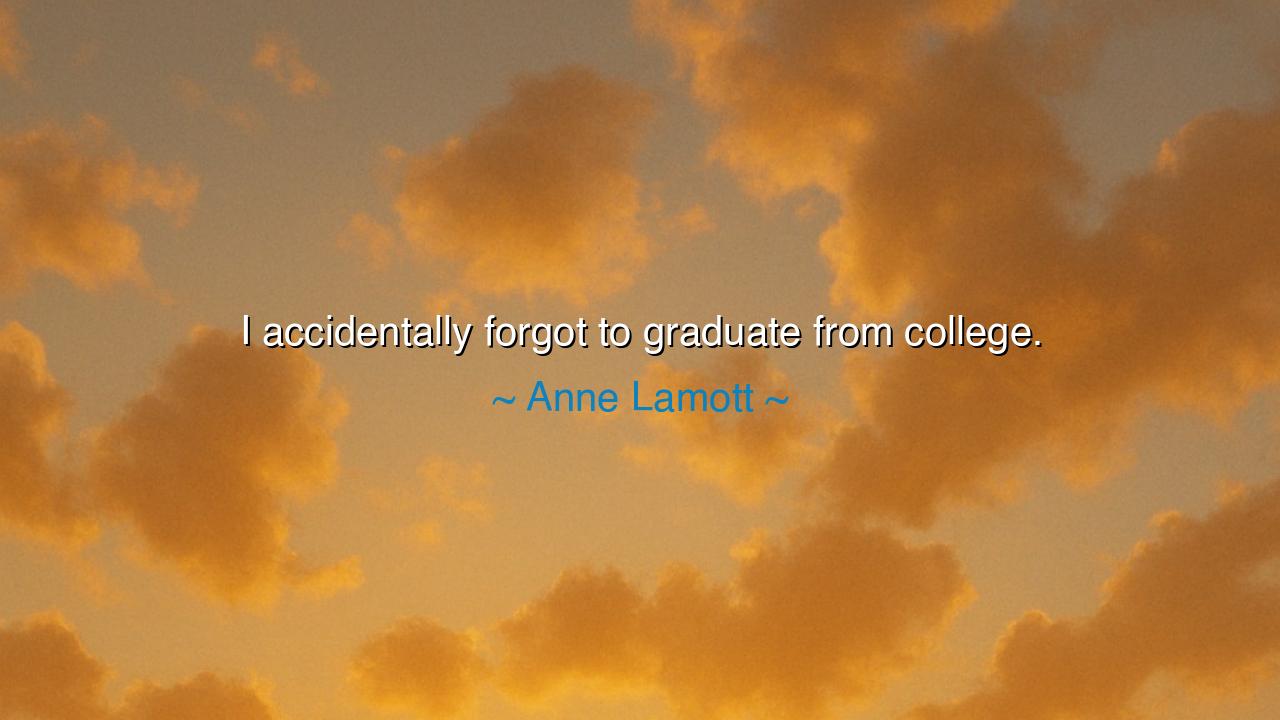
I accidentally forgot to graduate from college.






The words of Anne Lamott — “I accidentally forgot to graduate from college.” — are simple, even playful, yet within their brevity lies the quiet thunder of freedom, imperfection, and authenticity. They are the words of one who has learned that life’s worth cannot be measured by ceremony or certificate, that wisdom is not always sealed in parchment, and that sometimes the soul must wander beyond the walls of convention to discover its true education. In her wry humility, Lamott reminds us of an ancient truth: that the most meaningful lessons are not taught in classrooms, but in the unpredictable and often untidy unfolding of existence itself.
Anne Lamott, beloved for her wit and spiritual insight, has long written about the beauty of imperfection — about stumbling toward grace rather than sprinting toward perfection. Her confession that she “forgot” to graduate is not merely a factual remark; it is an emblem of her philosophy. It reveals her belief that life’s milestones are not always the milestones that matter. Many of us are taught to see education as a linear ascent — a path with clear stages, from diploma to degree to success. But Lamott’s words laugh gently at this rigidity. They whisper that the truest form of learning happens when we are too busy living to follow the script — when curiosity, creativity, and the chaos of being human take us where no syllabus can lead.
The ancients would have understood her meaning well. Diogenes of Sinope, the Greek philosopher who lived in a barrel and rejected the conventions of his time, once said that he was “searching for an honest man” — and in doing so, he abandoned the empty rituals of society to seek truth directly. Like Lamott, he defied the boundaries of formal education to discover wisdom in experience. To “forget to graduate,” in this deeper sense, is to forget to live by the expectations of others — to walk one’s own road even when it strays from the well-marked path. Lamott’s jest thus becomes a quiet rebellion, a declaration that the soul’s education is measured not by honors, but by honesty.
There is something profoundly freeing in her “accident.” To forget to graduate is to escape the tyranny of checklists — to refuse the idea that worth is tied to completion, that meaning exists only in success. In a culture that worships achievement, Lamott’s self-deprecating humor is an act of liberation. It says: I am not defined by my credentials, but by my compassion, my art, my laughter, my faith. And in that, she joins the long lineage of those who have chosen truth over approval. Consider Vincent van Gogh, who sold only one painting in his lifetime, and yet poured the fullness of his soul into his work. He, too, “forgot to graduate” from the world’s standards, and in doing so, left behind a legacy that transcends them.
Lamott’s words also carry tenderness — a humility that recognizes how little control we truly have. To “forget” implies not rebellion, but humanity. It acknowledges that the path of life is often messy, that we stumble, falter, and lose track. Yet in those very moments of imperfection, grace finds us. The ancient mystics taught that the divine hides itself in the ordinary, in the overlooked, in the forgotten. Thus, Lamott’s accidental omission becomes a parable: that even when we miss what others deem essential, we may still be exactly where we are meant to be.
Her story is a balm to those who fear that they have “fallen behind.” For in truth, there is no behind and no ahead — only the unfolding of one’s own journey. The education of the heart has no graduation day; it is lifelong, ever-renewing. Every heartbreak teaches tenderness, every failure teaches resilience, every joy teaches gratitude. The degree one earns in the quiet chambers of experience is more enduring than any diploma framed upon a wall. In this sense, Lamott’s “forgetting” becomes a remembering — a remembering of what truly matters.
So let this be the teaching, O listener: do not mistake achievement for awakening. If you stumble on your path, if you forget the milestones others hold sacred, take heart — for you may be walking toward something deeper. Seek learning not for recognition, but for transformation. Embrace the crooked road, the detour, the unmarked trail — for it is there that wisdom hides, waiting for the brave and the unhurried.
For in the end, Anne Lamott’s words remind us that life is not a checklist to be completed, but a mystery to be lived. To “accidentally forget” to graduate is to accidentally remember that growth cannot be measured — that the truest degrees are written not in ink, but in the soul. So live, learn, and wander freely, and let your education be eternal — not in the halls of the academy, but in the vast, imperfect, wondrous classroom of the world.






AAdministratorAdministrator
Welcome, honored guests. Please leave a comment, we will respond soon